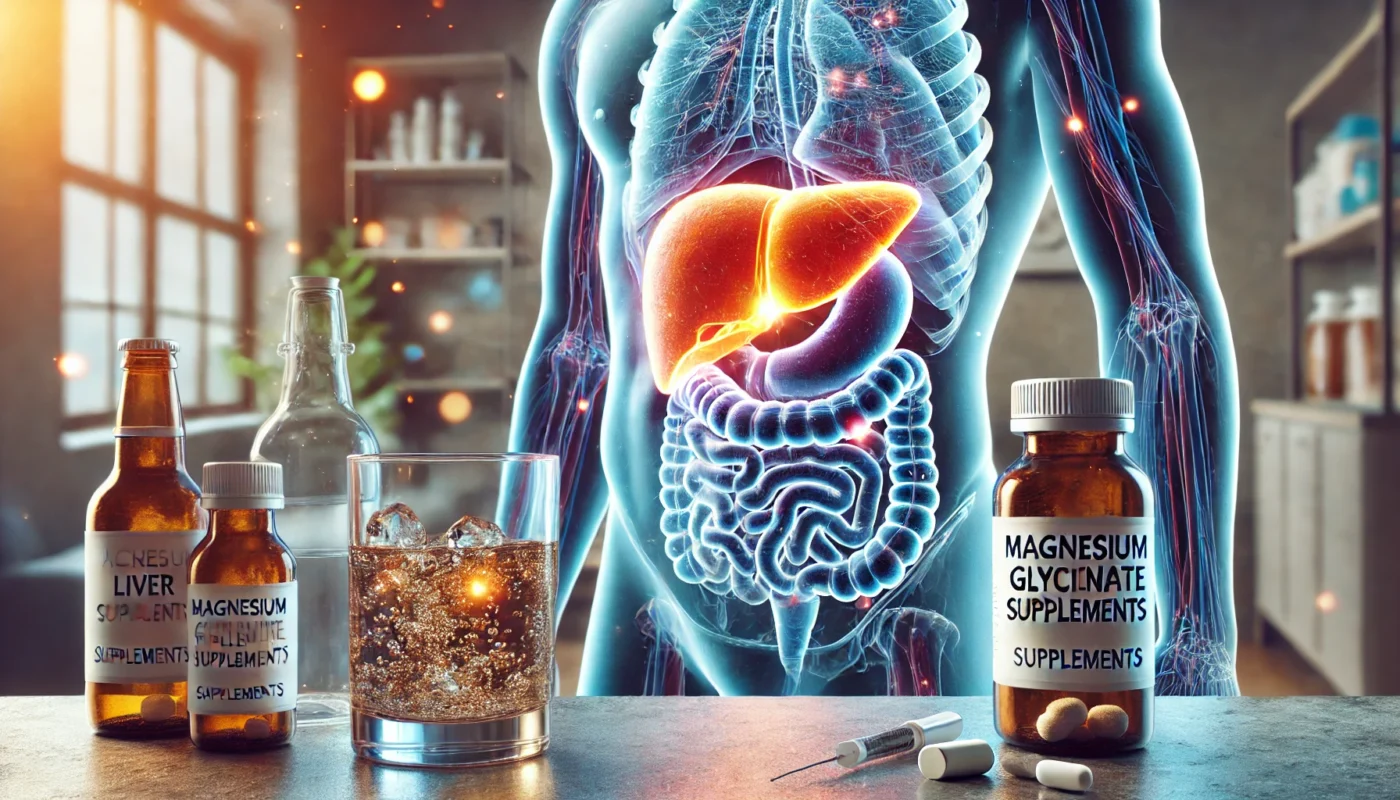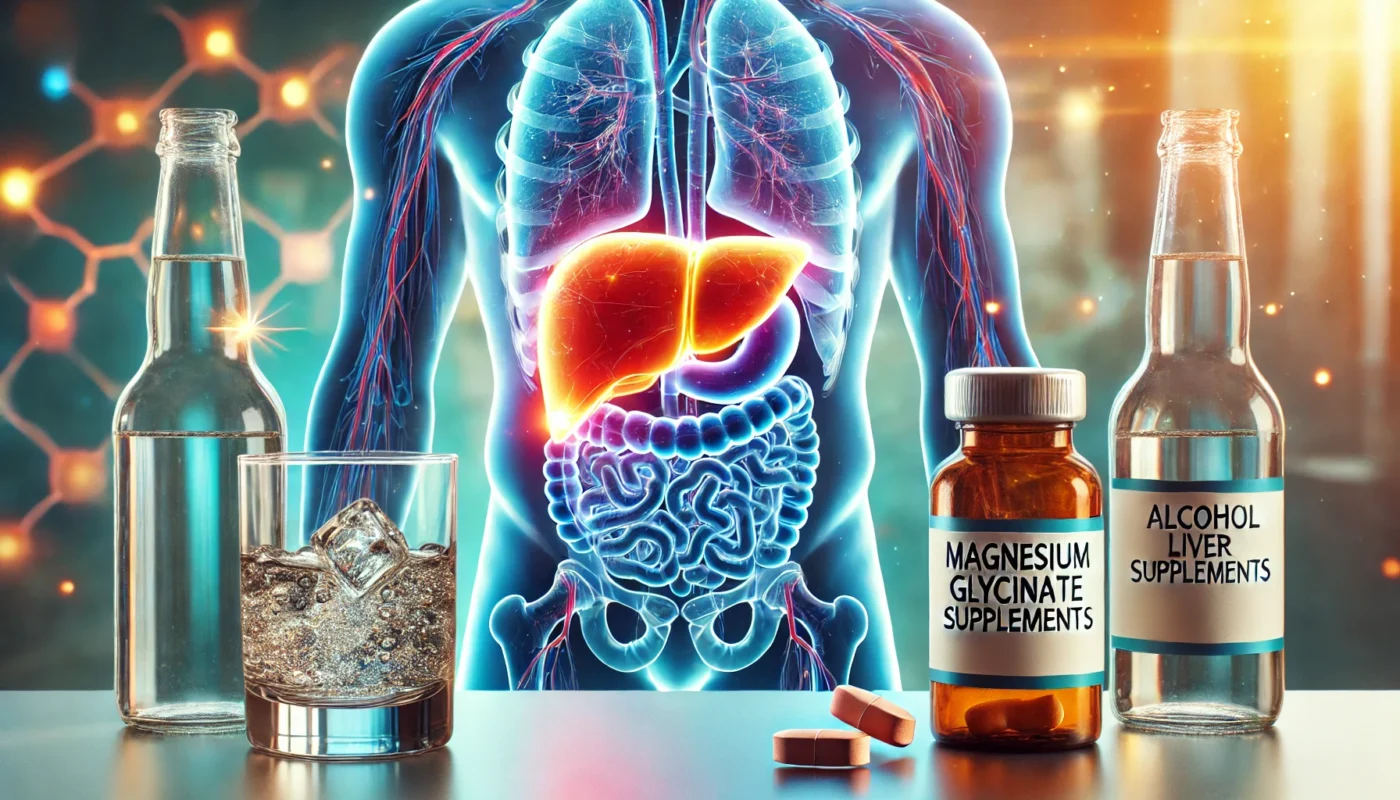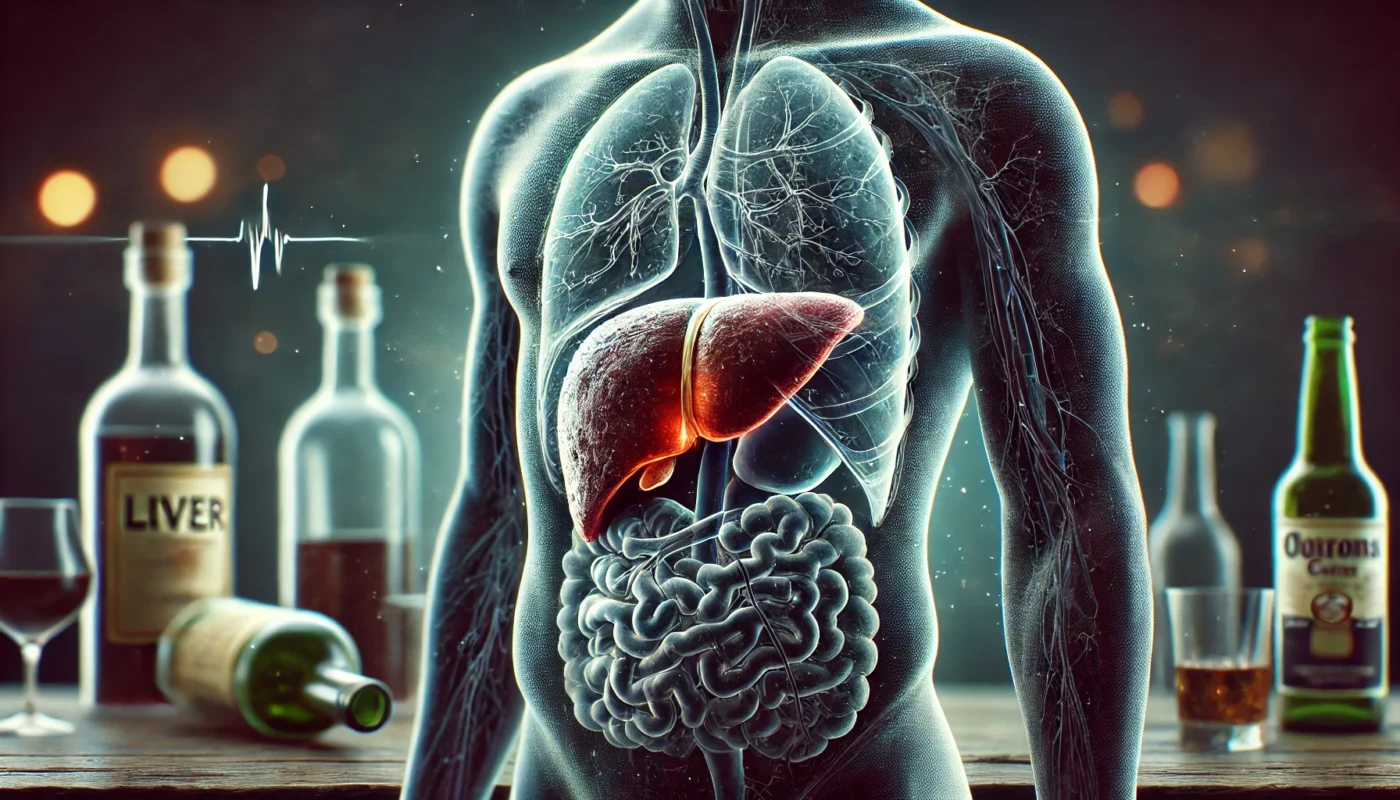Alcohol-induced liver damage, encompassing conditions like alcoholic fatty liver disease, hepatitis, and cirrhosis, is a significant global health issue. According to the World Health Organization (WHO), alcohol consumption accounts for nearly 5.3% of all deaths annually, with liver disease being a leading contributor. While abstinence and medical care are the cornerstones of recovery, nutritional interventions play a crucial role in supporting liver regeneration.
Magnesium glycinate, a highly bioavailable form of magnesium, offers promising benefits for individuals recovering from alcohol-induced liver damage. This article explores the science behind magnesium glycinate’s role in promoting liver cell regeneration, reducing inflammation, and supporting overall liver health.
You May Also Like:
How Magnesium Glycinate Can Help with Sinus Recovery After Infections
Can Magnesium Glycinate Prevent Exercise-Induced Asthma? Here’s What to Know
Alcohol-Induced Liver Damage: An Overview
Chronic alcohol consumption exerts a toxic effect on the liver, leading to progressive damage. Key stages include:
- Alcoholic Fatty Liver Disease (AFLD): Accumulation of fat in liver cells, often reversible with lifestyle changes.
- Alcoholic Hepatitis: Inflammation and swelling of the liver, potentially causing acute symptoms like jaundice and abdominal pain.
- Cirrhosis: Permanent scarring of the liver tissue, impairing its ability to function effectively.
Alcohol-induced liver damage occurs through multiple mechanisms:
- Oxidative Stress: Excessive alcohol metabolism generates reactive oxygen species (ROS), damaging liver cells.
- Inflammation: Chronic alcohol use triggers an inflammatory response, exacerbating tissue injury.
- Nutritional Deficiencies: Alcohol depletes essential nutrients, including magnesium, which are critical for liver repair.
According to a study in Hepatology, up to 90% of heavy drinkers develop fatty liver, and 10–20% progress to cirrhosis. These findings underscore the importance of targeted interventions to halt or reverse liver damage.
The Role of Magnesium in Liver Health
Magnesium is an essential mineral involved in over 300 enzymatic processes, many of which are critical for liver function and recovery. Its benefits include:
- Antioxidant Defense: Magnesium enhances the activity of antioxidant enzymes, such as glutathione peroxidase, protecting liver cells from ROS.
- Reducing Inflammation: Magnesium modulates inflammatory cytokines like interleukin-6 (IL-6) and tumor necrosis factor-alpha (TNF-α), which are elevated in liver diseases.
- Supporting Cellular Energy Production: Magnesium is a cofactor in ATP synthesis, essential for energy-dependent liver repair processes.
- Detoxification: Magnesium supports enzymes involved in alcohol metabolism and detoxification, reducing the toxic burden on the liver.
Studies published in Nutrients have linked magnesium deficiency to worse outcomes in liver disease, highlighting its importance in recovery.

Why Magnesium Glycinate?
Magnesium glycinate is a chelated form of magnesium bound to glycine, an amino acid. This combination offers unique advantages:
- High Absorption: Magnesium glycinate is more bioavailable than other forms, ensuring efficient delivery to liver cells.
- Reduced Gastrointestinal Side Effects: Unlike magnesium citrate or sulfate, magnesium glycinate minimizes diarrhea or stomach upset.
- Calming Effects: Glycine, a key component, has anti-inflammatory and antioxidant properties that enhance magnesium’s benefits.
These attributes make magnesium glycinate particularly suitable for individuals recovering from alcohol-induced liver damage.
Magnesium Glycinate’s Benefits in Liver Recovery
1. Promoting Liver Cell Regeneration
Liver cells, or hepatocytes, have a remarkable capacity to regenerate. Magnesium plays a critical role in DNA synthesis and cell division, processes essential for hepatocyte renewal. A study in Liver International found that magnesium supplementation accelerated liver regeneration in animal models after partial hepatectomy, suggesting its potential to support recovery in humans.
2. Reducing Oxidative Stress
Oxidative stress is a primary driver of alcohol-induced liver damage. Magnesium glycinate enhances the production of glutathione, the liver’s most powerful antioxidant. Research in Free Radical Biology & Medicine demonstrated that magnesium supplementation reduced oxidative damage by 40% in individuals with chronic liver disease, improving overall liver function.
3. Modulating Inflammation
Chronic inflammation contributes to liver scarring and fibrosis. Magnesium glycinate’s anti-inflammatory effects help suppress pro-inflammatory cytokines, mitigating further damage. A clinical trial in Nutrients reported that magnesium supplementation reduced inflammatory markers by 25% in patients with non-alcoholic fatty liver disease (NAFLD), a condition with overlapping mechanisms to alcohol-induced liver damage.
4. Preventing Fibrosis
Fibrosis, the buildup of scar tissue, impairs liver function and increases the risk of cirrhosis. Magnesium helps regulate the activation of hepatic stellate cells, which play a key role in fibrosis development. A study in Journal of Hepatology highlighted that magnesium supplementation reduced markers of fibrosis in liver tissue, supporting its potential in preventing disease progression.
5. Supporting Detoxification
Magnesium is essential for the enzymes that metabolize alcohol, such as alcohol dehydrogenase and aldehyde dehydrogenase. These enzymes help break down ethanol into less harmful substances, reducing the toxic load on the liver. Improved detoxification processes can accelerate recovery and improve energy levels.

Clinical Evidence Supporting Magnesium in Liver Recovery
Although direct studies on magnesium glycinate and alcohol-induced liver damage are limited, related research underscores its benefits:
- Improved Liver Function: A randomized controlled trial in Hepatology Research found that magnesium supplementation improved liver enzyme levels (ALT and AST) in individuals with liver inflammation.
- Reduced Oxidative Stress: Research in Nutrients showed that magnesium increased antioxidant capacity in patients with chronic liver conditions, reducing ROS and enhancing cell repair.
- Anti-Inflammatory Effects: A study in The American Journal of Clinical Nutrition demonstrated that magnesium supplementation reduced systemic inflammation by 20% in participants with metabolic syndromes affecting liver health.
- Fibrosis Prevention: Findings in Journal of Hepatology indicated that magnesium reduced fibrotic tissue formation in animal models of liver disease.
- Cellular Energy Support: A clinical trial in Journal of Cellular Biochemistry highlighted magnesium’s role in ATP production, improving cellular repair mechanisms in damaged liver tissues.
Incorporating Magnesium Glycinate into Recovery Plans
1. Dosage Recommendations
The recommended dietary allowance (RDA) for magnesium is:
- Men: 400–420 mg/day
- Women: 310–320 mg/day
For individuals recovering from liver damage, therapeutic doses of magnesium glycinate typically range from 300 to 500 mg/day. Always consult a healthcare provider before starting supplementation to ensure safety and efficacy.
2. Dietary Sources of Magnesium
While supplementation is effective, incorporating magnesium-rich foods can complement recovery efforts. Examples include:
- Leafy Greens: Spinach, kale, and Swiss chard.
- Nuts and Seeds: Almonds, pumpkin seeds, and sunflower seeds.
- Whole Grains: Quinoa, brown rice, and oats.
- Legumes: Black beans, chickpeas, and lentils.
- Fish: Mackerel and salmon.
3. Lifestyle Modifications
Magnesium glycinate works best when combined with lifestyle changes that support liver health:
- Abstinence from Alcohol: Complete avoidance of alcohol is crucial for liver recovery.
- Balanced Diet: Focus on whole foods rich in antioxidants, such as berries, cruciferous vegetables, and turmeric.
- Regular Exercise: Physical activity reduces inflammation and improves metabolic health.
- Adequate Hydration: Drinking plenty of water supports detoxification and cellular repair.

Future Research Directions
While current evidence supports magnesium glycinate’s potential, further research is needed to explore:
- Long-Term Effects: Investigating the sustained benefits of magnesium glycinate in chronic liver disease.
- Synergistic Therapies: Examining the combined effects of magnesium glycinate with other liver-supporting nutrients, such as zinc and silymarin.
- Direct Human Trials: Conducting randomized controlled trials to confirm its efficacy in alcohol-induced liver damage.
Conclusion: Supporting Liver Health with Magnesium Glycinate
Magnesium glycinate emerges as a valuable tool in the recovery from alcohol-induced liver damage. By promoting liver cell regeneration, reducing oxidative stress, and mitigating inflammation, this highly bioavailable supplement addresses key mechanisms of liver repair. Its gentle effects on the digestive system and synergistic benefits with glycine make it an ideal choice for long-term use.
For individuals on the path to recovery, integrating magnesium glycinate into a comprehensive care plan—alongside dietary and lifestyle changes—offers a promising approach to restoring liver health and improving overall well-being. Continued research will further illuminate its role in supporting liver regeneration and preventing disease progression.

References
- Alcoholic liver disease: mechanisms of injury and targeted treatment. Retrieved from: https://pubmed.ncbi.nlm.nih.gov/25782093/
- Alcohol-Related Liver Disease: Basic Mechanisms and Clinical Perspectives. Retrieved from: https://pmc.ncbi.nlm.nih.gov/articles/PMC8153142/
- Magnesium: A Defense Line to Mitigate Inflammation and Oxidative Stress in Adipose Tissue. Retrieved from: https://pmc.ncbi.nlm.nih.gov/articles/PMC11351329/
- Magnesium and Liver Metabolism Through the Lifespan. Retrieved from: https://www.sciencedirect.com/science/article/pii/S2161831323003149
- Magnesium and liver disease. Retrieved from: https://pmc.ncbi.nlm.nih.gov/articles/PMC6861788/
- Magnesium and Liver Metabolism Through the Lifespan. Retrieved from: https://pmc.ncbi.nlm.nih.gov/articles/PMC10334155/
- MAGNESIUM METABOLISM IN ALCOHOLISM. Retrieved from: https://pubmed.ncbi.nlm.nih.gov/14080503/
Important Note: The information contained in this article is for general informational purposes only, and should not be construed as health or medical advice, nor is it intended to diagnose, prevent, treat, or cure any disease or health condition. Before embarking on any diet, fitness regimen, or program of nutritional supplementation, it is advisable to consult your healthcare professional in order to determine its safety and probable efficacy in terms of your individual state of health.
Regarding Nutritional Supplements Or Other Non-Prescription Health Products: If any nutritional supplements or other non-prescription health products are mentioned in the foregoing article, any claims or statements made about them have not been evaluated by the U.S. Food and Drug Administration, and such nutritional supplements or other health products are not intended to diagnose, treat, cure, or prevent any disease.

